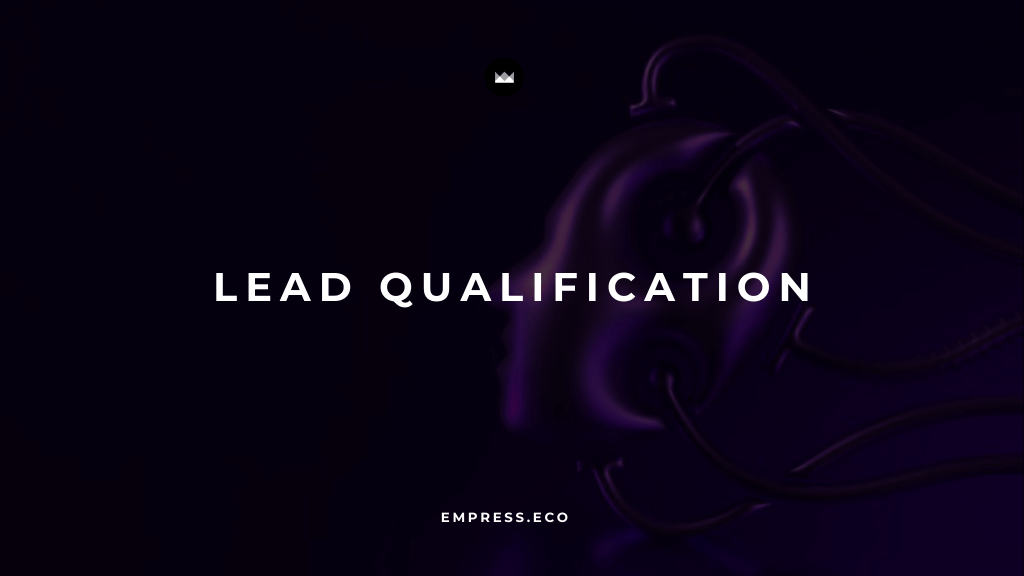
Prioritize High-Potential Leads with Effective Lead Qualification Strategies by IRIS
Effective Scoring Systems to Maximize Conversion Rates
Table of Contents
Lead Qualification: Prioritizing High-Potential Prospects
Effective Scoring Systems to Maximize Conversion Rates
In the competitive landscape of modern business, lead qualification is a critical process that helps sales and marketing teams identify and prioritize high-potential prospects. By implementing effective scoring systems, businesses can maximize conversion rates and optimize resource allocation. This blog explores the importance of lead qualification and provides actionable strategies for developing robust lead scoring systems.
Understanding Lead Qualification
Lead qualification is the process of evaluating potential customers to determine their likelihood of becoming paying clients. This involves assessing various factors such as fit, financial ability, interest, and need. The goal is to identify leads that are worth pursuing, thereby saving time and resources while increasing the chances of conversion .
Benefits of Lead Qualification
Improved Efficiency
By focusing on high-potential leads, sales teams can allocate their time and resources more effectively, reducing the effort spent on unqualified prospects .
- Targeted Efforts: Concentrating on leads that are more likely to convert increases productivity and ensures that sales efforts are directed towards the most promising opportunities.
Higher Conversion Rates
Qualified leads are more likely to convert into customers. By prioritizing these leads, businesses can improve their overall conversion rates and drive revenue growth .
- Increased Success: By identifying and focusing on leads with higher potential, businesses can boost their conversion rates significantly, leading to greater sales success.
Enhanced Customer Experience
Lead qualification allows for more personalized and targeted communication, improving the customer experience and fostering stronger relationships .
- Personalized Interactions: Tailoring communication to the needs and interests of qualified leads enhances their experience and builds trust.
Key Strategies for Effective Lead Qualification
Implementing Lead Scoring Systems
Lead scoring is a method of assigning point values to leads based on specific criteria such as demographics, behavior, and engagement. This quantifies the qualification process and helps prioritize leads efficiently .
Steps to Implement Lead Scoring:
- Define Criteria: Identify the key attributes that indicate a high-potential lead, such as job title, company size, and engagement level.
- Assign Point Values: Allocate points to each criterion based on its importance. For example, a lead from a large company might receive more points than one from a small business.
- Automate Scoring: Use CRM software to automate the scoring process, ensuring consistency and accuracy.
- Streamlined Process: Automation ensures that the scoring system is applied uniformly, reducing bias and improving efficiency.
Utilizing Qualification Frameworks
Several frameworks can guide the lead qualification process, including BANT, GPCTBA/C&I, CHAMP, and MEDDIC. Each framework focuses on different aspects of the lead's potential and can be tailored to fit specific business needs .
Popular Frameworks:
- BANT: Budget, Authority, Needs, and Timeline.
- GPCTBA/C&I: Goals, Plans, Challenges, Timeline, Budget, Authority, Consequences, and Implications.
- CHAMP: Challenges, Authority, Money, and Prioritization.
- MEDDIC: Metrics, Economic Buyer, Decision Criteria, Decision Process, Identify Pain, and Champion.
- Tailored Qualification: Choose a framework that aligns with your business model and sales process to effectively qualify leads.
Conducting In-Depth Research
Gathering detailed information about leads is crucial for accurate qualification. Use tools like Google Analytics, social media insights, and CRM data to understand lead behavior and preferences .
Research Techniques:
- Website Analytics: Track lead activity on your website to gauge interest and engagement.
- Social Media: Analyze social media profiles and interactions to gather demographic and psychographic data.
- CRM Data: Leverage CRM tools to compile comprehensive lead profiles and track interactions.
- Comprehensive Profiles: In-depth research ensures that your lead qualification is based on accurate and detailed information, leading to better prioritization.
Overcoming Challenges in Lead Qualification
Ensuring Data Quality
Accurate and up-to-date data is essential for effective lead qualification. Invest in data cleansing and enrichment processes to maintain high data quality .
- Regular Updates: Continuously update and cleanse your database to ensure the accuracy and relevance of your data.
Balancing Automation and Personalization
While automation enhances efficiency, maintaining a personal touch is crucial for building relationships. Balance automated processes with personalized interactions to foster trust and engagement .
- Hybrid Approach: Use automation for routine tasks and combine it with personalized follow-ups to enhance the customer experience.
Managing Resource Constraints
Lead qualification can be resource-intensive. Ensure you have the necessary tools and team members to manage and optimize the process effectively .
- Resource Planning: Allocate resources strategically to balance the demands of lead qualification with other business priorities.
Case Studies: Successful Lead Qualification
Salesforce’s Lead Qualification Process
Salesforce uses a comprehensive lead qualification process that includes lead scoring, data analysis, and personalized follow-ups. This approach has helped Salesforce improve lead conversion rates and optimize sales efforts .
- Integrated Systems: By combining automated scoring with detailed data analysis and personalized communication, Salesforce maximizes its lead qualification efficiency.
HubSpot’s GPCTBA/C&I Framework
HubSpot developed the GPCTBA/C&I framework to address modern buyer behavior. By aligning their qualification process with the prospect’s goals and resources, HubSpot has achieved higher conversion rates and more effective lead management .
- Customer-Centric Approach: This framework helps HubSpot align its sales process with the specific needs and challenges of its leads, improving conversion rates.
Conclusion
Lead qualification is a vital component of an effective sales strategy. By implementing robust lead scoring systems and utilizing proven qualification frameworks, businesses can prioritize high-potential prospects and maximize conversion rates. Overcoming challenges such as data quality and resource constraints ensures that lead qualification processes remain efficient and effective.
As the business landscape continues to evolve, adopting advanced lead qualification techniques will be crucial for maintaining a competitive edge and achieving sustained growth. By focusing on high-potential leads, businesses can optimize their sales efforts and drive long-term success.
Empress Newsletter
Join the newsletter to receive the latest updates in your inbox.







